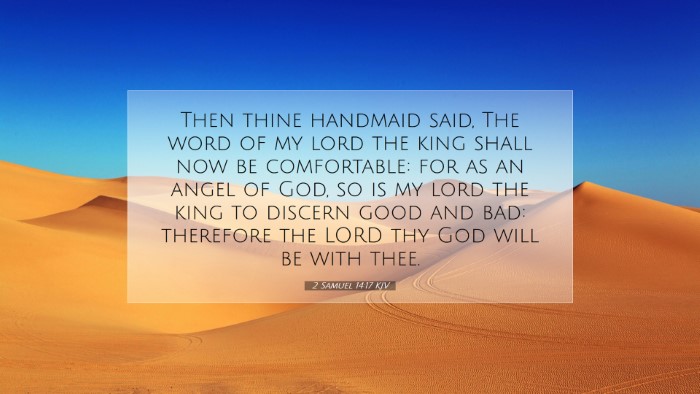Commentary on 2 Samuel 14:17
2 Samuel 14:17 presents a pivotal moment in the narrative of King David’s reign and his family dynamics. The verse reads:
"Then your maidservant said, The word of my lord the king will now be comfortable: for as an angel of God, so is my lord the king to discern good and bad: therefore the Lord thy God will be with thee."
Contextual Background
This verse is situated within the larger context of Absalom's rebellion and the estrangement that has developed between David and his family.
The woman of Tekoah, who approaches David in this chapter, embodies the complex interplay of politics, familial love, and divine wisdom.
Her plea for mercy for her son mirrors the inner turmoil and dysfunction within David’s royal household.
Interpretation and Analysis
The Woman of Tekoah's Role
The woman from Tekoah serves as an instrument of wisdom and insight, skilled in the art of persuasion.
Her acknowledgment of David's capacity to discern good and evil not only flatters him but also reminds him of his role as a just ruler.
As Matthew Henry notes, "She appeals to his wisdom and judgment, assuring him that he possesses the qualities of an angel of God in his ability to evaluate righteous and unrighteous matters."
The Divine Touch: Angelic Imagery
The reference to the king being as "an angel of God" is significant. Angels in scripture are often messengers and agents of God’s justice and mercy.
This designation places the king’s responsibilities at a divine level, suggesting that he is expected to act with righteousness.
Albert Barnes elaborates, stating that the woman acknowledges that David has the power to bring about reconciliations and resolutions, akin to the intervening influence of an angel.
Discernment of Good and Bad
David’s discernment is pivotal for governance. The ability to distinguish between good and bad is a hallmark of righteous leadership.
Adam Clarke points out that this ability not only pertains to moral decisions but also to interpersonal relations within the kingdom, emphasizing the need for a wise and discerning heart in leadership.
Theological Implications
This verse opens up broader theological themes relevant to pastoral ministry and Christian life.
The appeal for divine wisdom can act as a reminder to modern-day leaders—including pastors and church elders—to seek divine guidance in their decision-making processes.
-
Divine Authority: The acknowledgment of God’s presence with the king serves as a reminder that true authority originates from God.
-
The Responsibility of Leadership: Just as David is called to discern good and bad, leaders today must strive to uphold righteousness and justice in their communities.
-
Intercession and Advocacy: The woman of Tekoah exemplifies the role of an advocate, urging the king toward mercy and reconciliation—a role that pastors fulfill when they intercede for their congregations.
Pastoral Applications
For pastors and leaders, this verse serves as a valuable lesson in humility, the pursuit of wisdom, and the commitment to moral clarity.
Each leader is called to emulate David's intended role as one who discerns God's will amid complex human emotions and conflicts.
-
Pursuit of Wisdom: Leaders should continually seek wisdom from God, recognizing that their discernment impacts the lives of others.
-
Cultivating Relationships: Just as the woman used her relationship with David to appeal for justice, leaders can foster relationships that encourage open dialogue and reconciliation.
-
Fostering a Culture of Mercy: The desire for reconciliation expressed by the woman invites contemporary leaders to prioritize mercy and understanding in their leadership practices.
Conclusion
2 Samuel 14:17 encapsulates a vital message concerning the nature of righteous leadership, the importance of discernment, and the positive influence of an advocate's voice.
By blazing a pathway for reconciliation and embodying the divine wisdom expected of them, leaders can foster communities that reflect the character of God.
In summary, this verse is not merely historical; it provides enduring principles that resonate profoundly with the ongoing challenges faced by modern leaders within the church and society at large.


